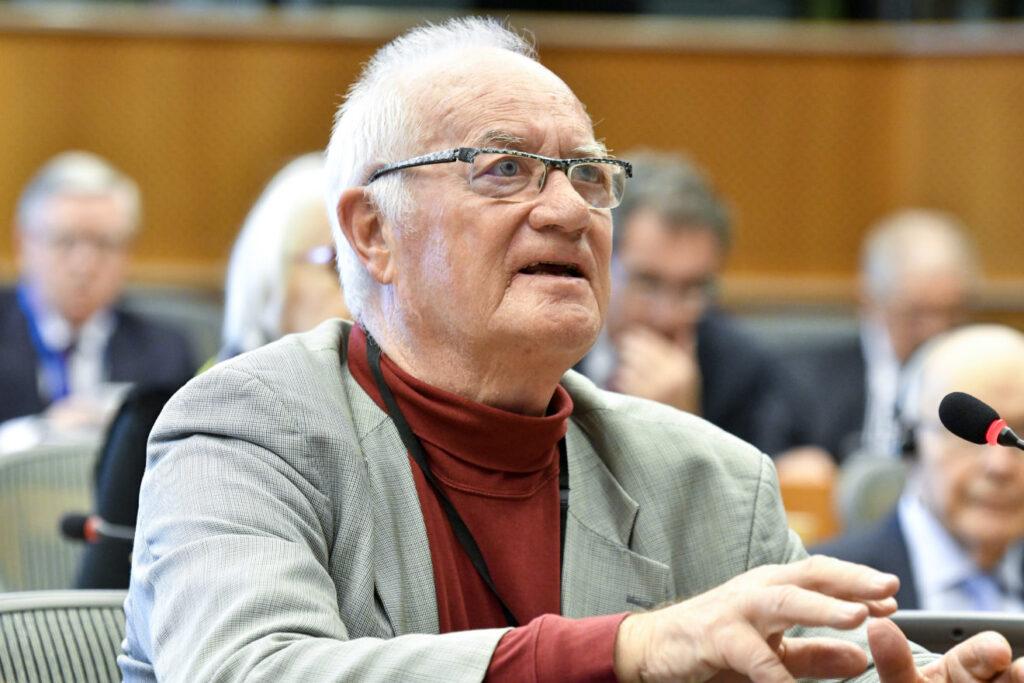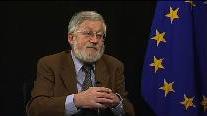Six-term eurosceptic MEP and EU transparency activist Jens-Peter Bonde died on 4 April.

Jens-Peter Bonde sat in the European Parliament as a Danish member for six consecutive terms, from 1979 until 2008. 17 years of that stint were served in the college of presidents. Bonde combined a fabled knowledge of the law and institutional details of European decision making with a critical outlook of the European decision-making process. Over the years, he wrote more than 60 books on the EU, including annotated versions of the European Treaties, and occasionally in co-authorships with European federalists – a position he himself wholeheartedly opposed. Within the European Parliament he became “a kind of a think tank“. His background as a journalist triggered in him a keen interest in the issue of transparency and freedom of information. Indeed, he gradually became known as “Mr Transparency”, a nickname for his being, according to a fellow MEP, “a permanent thorn in the side of all those in positions of authority“.
Constructive opponent by temperament
Bonde thus embodied a principled eurosceptic and a constructive transparency activist in one politician. A profile in the European Voice in the early 2000s characterised Bonde as a “man of contradictions” and even a “sort of Dr Jekyll and Mr Hyde figure”. On the one hand, his imposing physical appearance, assertive demeanor, bombastic generalisations and constant preparedness to pick a political fight were said to have made many a political opponent uncomfortable, creating plenty of enemies among them. On the other, his tireless advocacy for greater openness and less secrecy and backroom deal making, backed up by deep dossier knowledge, concrete proposals and a long-term perspective on the notion of parliamentary oversight, lead many to the conclusion that he eventually strengthened the cause of transparency and democracy at the European level, rather than undermining it. Many political opponents moreover recall his fair-mindedness and preparedness to listen to the other side. One-time British EU affairs minister Denis MacShane argues that “He never turned ugly and racist like a Le Pen, père et fille, a Farage, a Salvini, a Wilders, or AfD and FPÖ MEPs.”
In his 22 years as a lawmaker he ‘never received adequate information’ from the Council of Ministers or European Commission but instead had to go ferreting it out like a journalist, Bonde complained in 2001.
These conciliatory words do not imply that he held back from consistently pressing where it hurts when it came to the opacity of European decision making. In a speech to fellow MEPs around the turn of the century for example, he complained that “70% of all laws are passed by junior civil servants in working groups” and that “in his 22 years as a lawmaker he ‘never received adequate information’ from the Council of Ministers or European Commission but instead had to go ferreting it out like a journalist”, issues that are still widely acknowledged and problematised by EU scholars.
In a particularly funny exchange cited in an obituary on Politico, Bonde recounts how he once called out then-Commission President Prodi:
Bonde [...] approached Prodi with "two piles of paper." One, he told Prodi, were the minutes "you publish on the Internet and send to the Parliament." The other, he said, were the minutes "you distribute internally." The public minutes were 10-12 pages. The internal minutes? "Around 100 pages." "One pile clearly showed what had been discussed within the Commission, while the other showed what the Commission wanted the public to see," Bonde wrote. "'Mamma mia,' Romano exclaimed spontaneously. I am absolutely sure he was genuinely surprised."
Parliamentary career
Bonde’s career in politics started with membership in the Danish Social Liberal Party, followed by a controversial period in the Danish Communist Party (a choice which he later described as “naive”), and a role as journalist. He entered the European Parliament upon the first direct elections in 1979 and stayed there until 2008, as part of changing political groupings, starting out with the People’s Movement against the EU. In 1986, he married Lisbeth Kirk, who later founded the Brussels-based online newspaper EUObserver, until today an influential news outlet among EU policy wonks and insiders. (In the 2000s, this private affiliation prompted a policy consultant to caution reticence with the website for its alleged “opaque political line”.) In the 1980s, Bonde still advocated a complete Danish withdrawal from the European Communities. In the same spirit, he led his Danish compatriots in their rejection of the Maastricht Treaty in a 1992 referendum. This electoral blow is generally regarded in EU scholarship as a major contributing factor in forcing politicians to face up to the question of transparency and the newly-founded Union’s lack of it.
Noting that Denmark was not likely to withdraw from the EU any time soon, Bonde gradually transformed himself into a thorn in the flesh, rallying against intransparency with a natural talent for attracting public attention.
Noting that Denmark was not likely to withdraw from the EU any time soon, Bonde gradually transformed himself into a thorn in the flesh, permanently capitalising on the EU’s democratic weaknesses. He co-founded the eurosceptic June Movement and rallied against intransparency with a natural talent for attracting public and media attention. Over time, he became “something of a people’s hero” in his native Denmark, European Voice ‘Politician of the Year’, and self-professed most quoted EU politicians in British media.
In Brussels politics however, he evolved into a permanent fixture, merging his Danish party into a newly-founded eurosceptic EUDemocrats group in the early 2000s. As such, he became known as “a constructive leader of an odd group” (Manuel Barroso’s description). Even in the (possibly somewhat smoothed-over) assessment of the arch-pragmatic conservative Jean-Claude Juncker, it was “difficult […] to discover deeper differences and divergences”.
Indeed, Bonde gradually seems to have moved towards a more EU-friendly position over time, though he might have been loath to put it that way. “European democracy”, Bonde wrote in 2002, as the Convention on the Future of the European Union got under way, “will never function, even if it might be a beautiful dream.” Yet, while it existed de facto anyway, quietly buzzing in the Brussels bubble, he acted as its stern trustee.
“European democracy”, Bonde argued, “will never function, even if it might be a beautiful dream.” But while it existed anyway, he acted as its trustee.
Bonde’s legacy might take some time to be precisely defined, in a European political landscape that has already profoundly changed since he left it in 2008. “Denmark and Europe will be quieter and less daunting in his absence”, a former fellow MEP assessed last week. While neither the EU nor its transparency question seem set for quiet and serene times for the forseeable future, with Bonde dies a specific type of noise and challenge – a better-informed and less opportunistic strand of eurosceptic transparency politics of an earlier era in EU politics.


